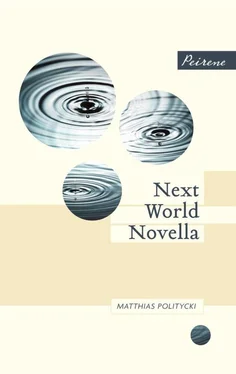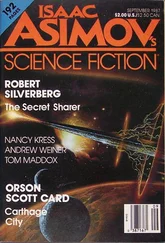Matthias Politycki - Next World Novella
Здесь есть возможность читать онлайн «Matthias Politycki - Next World Novella» весь текст электронной книги совершенно бесплатно (целиком полную версию без сокращений). В некоторых случаях можно слушать аудио, скачать через торрент в формате fb2 и присутствует краткое содержание. Год выпуска: 2011, Издательство: Peirene, Жанр: Современная проза, на английском языке. Описание произведения, (предисловие) а так же отзывы посетителей доступны на портале библиотеки ЛибКат.
- Название:Next World Novella
- Автор:
- Издательство:Peirene
- Жанр:
- Год:2011
- ISBN:нет данных
- Рейтинг книги:4 / 5. Голосов: 1
-
Избранное:Добавить в избранное
- Отзывы:
-
Ваша оценка:
- 80
- 1
- 2
- 3
- 4
- 5
Next World Novella: краткое содержание, описание и аннотация
Предлагаем к чтению аннотацию, описание, краткое содержание или предисловие (зависит от того, что написал сам автор книги «Next World Novella»). Если вы не нашли необходимую информацию о книге — напишите в комментариях, мы постараемся отыскать её.
Hinrich takes his existence at face value. His wife, on the other hand, has always been more interested in the after-life. Or so it seemed. When she dies of a stroke, Hinrich goes through her papers, only to discover a totally different perspective on their marriage. Thus commences, a dazzling intellectual game of shifting realities.
Next World Novella — читать онлайн бесплатно полную книгу (весь текст) целиком
Ниже представлен текст книги, разбитый по страницам. Система сохранения места последней прочитанной страницы, позволяет с удобством читать онлайн бесплатно книгу «Next World Novella», без необходимости каждый раз заново искать на чём Вы остановились. Поставьте закладку, и сможете в любой момент перейти на страницу, на которой закончили чтение.
Интервал:
Закладка:
At first it seemed as if his shaking hands were holding a long, unusually long set of editorial comments. Beneath the top sheet, where the handwritten lines soon became crooked and agitated until finally all the words were in the middle of the page, lay many other sheets, meticulously filled with Doro’s familiar handwriting. Under those was a typewritten manuscript, the first page at the bottom of the stack and untitled; only after leafing forwards and back for a while did he realize that this was a fragment he had discarded long since and far from being a serious work of scholarship. How had Doro found it, even thought it worth editing — and she had obviously been editing it for days — this old, forgotten text of his? He hadn’t concealed or destroyed it, he had just forgotten when he last had had it in his hands. The longer he thought about it, the more certain he felt that Doro had been looking for something, something else. Schepp fell into all kinds of speculations; he hardly noticed the sheets of paper slipping from his hands and falling on the patterned wood of the parquet. The throbbing in his throat grew worse and worse, and a rushing in his ears began to make him dizzy.
Once he had opened the window he felt better. He tried not to shrink from the chilly presence of Doro waiting for him on the other side of the desk, with a smell about her that would certainly have embarrassed her very much when she was alive. When you’re dead, she had once whispered in his ear before going to sleep, you can’t smell anyone any more, isn’t that sad? Schepp felt ashamed on her behalf, and whispered that there was no need for her to feel ashamed, he loved her all the same; perhaps he loved her even more for her inviolability and the stillness she radiated, had radiated even in life, had he ever told her that?
He replaced the cap on her fountain pen, righted the empty glass, retrieved the scattered sheets of paper from the floor and hesitated again, staring at the last page of Doro’s comments. They read:
… turned into its opposite, the gentle wind above, the rejoicing lake beneath. ‘It is good to cross the great water.’ But without you, Schepp, do you understand, without you. As far as I’m concerned, and now I will say it once and for all, you can go straight to Hell! Along with Hanni and Nanni and Lina and Tina and
whatever they might be called. Your
I’m sorry, my head
suddenly hurts again,
like when I
Had Doro really written that? The spaces between the words became larger and larger, the rest was illegible, or no, at the bottom of the page, on the right-hand side, there was a little more in a shaky, entirely unfamiliar hand. It took Schepp some time to decipher it.
and now this too
well we’ll
talk about it
Doro’s last words — how they blurred before his eyes! The pattern of the parquet — how it stretched away to the surrounding bookcases, which held his publications and special editions as well as standard works and volumes of commentaries, and on which were arranged all the things he had brought back from lecture tours and guest professorships, together with photographs of the children, Pia radiant just before her wedding, Louisa looking sulky because he never had time in the evening for anyone but his ‘silly old Chinese people’ — it was all there, but now so far removed that he saw none of it. Schepp had been left desperately alone. All he had were the sheets of paper that Doro had written for him.
But written in what kind of confusion, and by which Doro? Obviously she hadn’t been entirely in her right mind; he’d never known her to sound so out of control, so wild, so forceful. What on earth had come over her? Doro, that fragile little woman whose discretion he had always admired! He wanted to start reading at once, from the beginning — ‘As far as I’m concerned’ — no, something wrong there — ‘As far as I’m concerned, you can go straight to Hell’, and when had she ever addressed him by his surname? Was she making fun of him?
It was no good, he had to read it. Yes, maybe he ought to have let the children know first, but did a few more minutes make any difference? Yes, he ought to have called a doctor to fill out a death certificate. But which doctor should he have called, when Doro wasn’t even registered with a GP? And then it really would have been over, they’d take what was left of her away, and emptiness would move in, first into her favourite places, soon even into the most remote nooks and crannies — no! There was time enough for that in what life he had left. Gesticulating at the room, right index and little fingers extended as if in full flow, talking himself into true lecturer’s mode, Schepp strode back and forth, punching accentuated reprimands into the air with his fist, until he came to a halt by the window. And saw that life outside was still going on as usual.
He would just stand there, then, stand there until he finally fell over, or woke up, or until the world came to an end. Standing like that also meant that he didn’t have to look at Doro. What had she died of, anyway, when she had never been really sick? As if her doubts about conventional medicine had kept her healthy. Apart from two or three migraines a year, she had managed very well indeed without all the check-ups and aftercare that kept her sister happy. ‘No tumour, no heart problems,’ she had been told after a CT scan following one of her migraines. ‘Everything’s in good working order.’ These days people didn’t just drop dead at the age of fifty-six!
Although she herself used to be preoccupied with that very thing. It was how he had met her in the first place, he was then a mere Teaching Fellow whilst she was already a Lecturer in the Faculty. Out of the blue, she had told him about her fear, her great fear of the cold, dark lake whose shores you’d reach immediately after you died, only to die there a second time. Or whatever it could be called when you were already dead. He had almost let slip a stupid remark, saw the tears in her eyes just in time.
So now it’s happened, thought Schepp, now she really has gone to the place she’s dreaded all her life. And what about me? I promised to hold her hand there, and I’ve failed her. Had she already reached the lake? Was she standing on the shore scanning the water for an island, the island that, during their life together, he had hoped she would find there? Perhaps she had already taken her first steps into the water, bravely, without any fuss, in her usual way. Perhaps she was swimming with calm and steady strokes towards a second death? No, no, Schepp was sure that whatever Doro was doing on the other side, at least she wasn’t doing that ; she had always promised not to.
It had been in the winter term of 1979–80. He had been adoring her from afar for two years, ever since she had suddenly moved into the room opposite his. Whenever he had brought over a pot of green tea for her, she had been intently studying the I Ching. He was in his mid-thirties, just completing the thesis on ancient Chinese script that would qualify him as a lecturer, and well on the way to becoming number one in Germany in his field, because there was no number two working on the same subject. Nine years younger, she didn’t have her PhD yet, but already had a full-time appointment. She was the constant subject of gossip at the Institute, perhaps even throughout the entire Berlin’s Free University. Dorothee Wilhelmine Renate, Countess von Hagelstein, who apparently had been two years ahead of her age group at school, and who had spent a year in Taiwan before beginning her university studies; Dorothee Wilhelmine Renate, Countess von Hagelstein, whose forebears had made their fortune importing Chinese art, also acquiring a rather dubious reputation under the Third Reich; Dorothee Wilhelmine Renate, Countess von Hagelstein, courted by everyone in Faculty II, Sinology, including the professor, who had created the post of assistant for her with no trouble at all, and who then also saw to her seminars on ‘The History and Theory of Feng Shui’, and on ‘Women’s Poetry during the Tang Dynasty’, and of course, also, every term, on the subject of her dissertation: ‘Three Thousand Years of the Wisdom and Prophecies of the I Ching’; ‘The Flowing Together of All Things in the I Ching’; ‘The Dark Lines of the I Ching’.
Читать дальшеИнтервал:
Закладка:
Похожие книги на «Next World Novella»
Представляем Вашему вниманию похожие книги на «Next World Novella» списком для выбора. Мы отобрали схожую по названию и смыслу литературу в надежде предоставить читателям больше вариантов отыскать новые, интересные, ещё непрочитанные произведения.
Обсуждение, отзывы о книге «Next World Novella» и просто собственные мнения читателей. Оставьте ваши комментарии, напишите, что Вы думаете о произведении, его смысле или главных героях. Укажите что конкретно понравилось, а что нет, и почему Вы так считаете.












